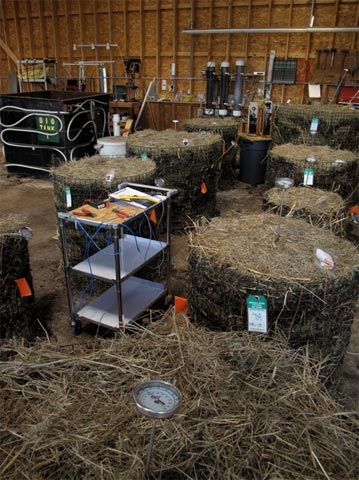Compost Process Characterization
Composting – an open process. Unlike soil, compost – whether active or finished – is remarkably rich in carbon-containing organic matter and exhibits enhanced biological activity lasting for years. Compost may undergo biochemical changes in a single day that soils may only exhibit over an entire season. From an environmental perspective, compost is remarkably unstable. But this property can be exploited to many advantages in farming and for remediation. For example, the instability of organic-nitrogen in compost confers a very high nitrogen release potential, useful for crops. At the same time, it is imperative that nitrogen cycling during composting be managed as efficiently as possible. Woods End is the laboratory to consult regarding compost activity, stability and end-use quality. The lab has over decades developed a variety of advanced methods to characterize “decay half-life”, carbon-mineralization and nitrogen stability.
Experience and Research: Woods End Laboratory has operated an active compost analytic section alongside its soil testing since the 1980’s, and may be America’s first dedicated compost analysis lab. Over the years we have mapped-out many of the forces and factors that influence final compost quality. From this we have arrived at a set of integrative tests appropriate to environmental, agricultural and horticultural end-uses.
Carbon Quality Parameters: Woods End labs offers a for traits of compost that cannot be easily analysed at other labs.
- Extent of degradation: Concentration of Ash vs carbon-residues, hourly, daily and monthly C-respiration rates
- Stability of Nitrogen: N-volatility and CO2:NH3:NO3 ratio for maturity
- Anthropogenic contaminants: plastic, micro-plastic, glass, plant-active chemicals
- Decay rate kinetics: fate of man-made ingredients (textiles, bioplastics, agri-chemicals) present in or added to composts
The Science of Compost decay: Biodegradation as examined in high-carbon materials like compost is an ever-changing field of science. Composting as a modern practice and awareness largely originated within the organic farming movement as a farmer-based innovation to manage the return of nutrients and organic matter to soils within farming systems. Presently, composting holds an even broader significance to society with a potential for “cradle-to-cradle” opportunities with organic wastes previously under-utilized.
Carbon and the Environment: Woods End Labs employs principles of holistic science management in a GLP lab background to evaluate and solve thorny issues of interactions of materials with the environment. These range from oxygen consumption to carbon-mineralization and “sequestration” as well as ammonia stabilization.
Open Source to Innovation: The combination of an “open-source” framework for research-level testing and broad experience in the characterization of soil-amendments means that Woods End lab is able to skillfully identify needed analysis and fulfill it in a cost-effective manner. Our clients move rapidly forward in appropriately characterizing their process and product potential.
Contact us: Email us with a list of your needs and we’ll respond with some suggestions for a test-regimen. Please do not mail samples to Woods End without prior project type approval!

